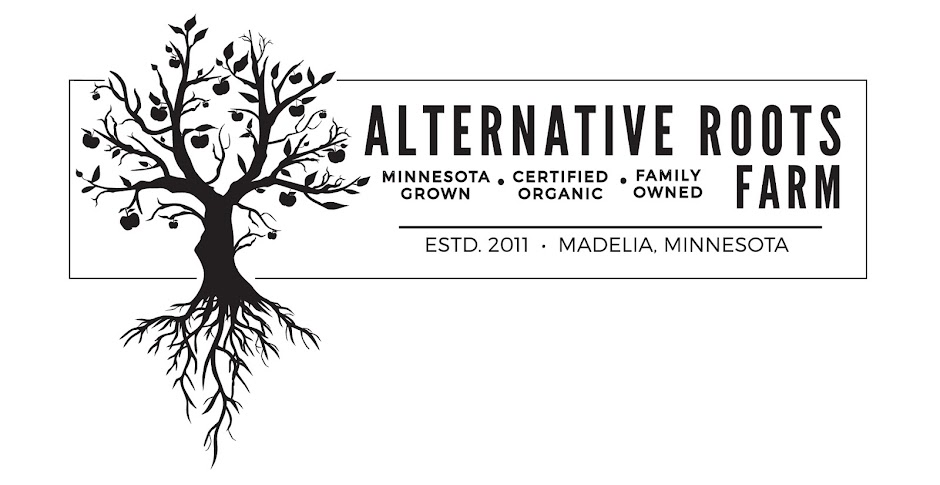All 2013 CSA Shares are SOLD OUT for the season.
2013 Farm Shares are still available and will be sold on a first come, first served basis.
Click on the tabs above for more general information on Farm Shares & delivery schedule for our 2013 Farm Shares.
Thanks for all your support and enthusiasm--we look forward to a great season!
Thursday, February 28, 2013
Tuesday, February 26, 2013
Farming for Ideas
For myself as a young beginning organic farmer going to the annual MOSES Organic Farming Conference was something I had dreamed about for the last two years, so last weekend's trip to La Crosse for the event was very exciting. I was ready to get my learning on, see what this experience was all about and, I'm not going to lie, I was excited about the food too.
 |
| Keynote speaker Jeremy Siefert talking about his new film GMO OMG. I'm looking forward to seeing this when it comes out! |
 |
| Just one of the workshops I attended. |
 |
| Beginning farmers sharing their experiences--ups and downs. |
Lastly, on the drive home, I picked up our pigs (here's where I make up for all the boring pictures)--Oliver, Yoda, Daisy, Jaymey and Lauren (named by our neice Lauren)!
Friday, February 1, 2013
Half Shares now Available!
In response to our vivacious vegetable loving, fabulous fruit enjoying customers we have added Half Shares to our offerings!
2013 CSA
Full Shares: $450 - 18 weeks of deliveries, weekly, June-October
Half Shares: $250 - 9 weeks of deliveries, a full box every-other week, June-October
Check out more details about our 2013 Sign Up, or About CSA & Farm Shares.
We would love to have you join our Community Supported Agriculture (CSA) program this year!
You can take a gander at the 2012 Newsletters and Box Photos to get a visual idea of what a CSA season is like, or to get recipe ideas.
When you're ready to sign up just download the Order Form, or ask us to mail one to you.
Contact us with any questions you may have, or to reserve your share today!
To keep up with news on the farm sign up to get our blog posts sent directly to your email over on the right-hand sidebar of the webpage, or you can contact us to get on our email list at alternativerootsfarm@yahoo.com, or follow us on facebook.
Bee House Project
When we think of pollinators, often the first thing that
comes to mind is the honeybee. Honeybees do their share, but behind the scenes
there are a variety of other native bees handling the majority of pollination services, which receive little recognition. Today we are focusing on our native
orchard and mason bees. See our bee houses project for orchard and mason bees from last year.
These orchard and mason bees go about their day gathering nectar from a surprising number of flowers and bringing it
back to their nest to provide food for their soon-to-be offspring. While they are visiting flowers,
pollen from the flower sticks to the bees body hairs; then, when they visit
another flower of the same variety, with the attached pollen, pollination occurs. A female mason bee will lay 5-6 eggs in 5-6
different chambers (6” long nesting tube), according to the US Dept. of Agriculture. Up to 75 separate flower visits may be needed, per foraging trip, and up to 15-40 foraging trips may be required to provide enough of a provision of nectar and pollen for a single
chamber.
So, lets do the math...how many flowers could a female mason bee need to visit to fill 6 chambers with
the necessary pollen in a nesting tube:
75 (separate flower visits/foraging trip) x 27 (foraging
trips/single chamber) x 6 (chambers) = 12,150
That is potentially 12,150 flower visits per season for that single bee
to raise her young! If that’s not
pollination at its finest I don’t know what is!
These amazing little creatures do not create colonies like
the honeybee, rather they are solitary but gregarious (they construct
nests near one another). Being
gregarious is what makes building nesting boxes a viable idea for your garden
pollination needs. While it is important to provide nesting habitat for the
bees, it is equally important to provide an array of flowering plants that
bloom throughout the growing season. A list of native flowering plants can be found on the Xerces Society
website. Finally, it should be
noted that these bees rarely sting; they are typically very docile and mellow –
so don’t worry about inviting more bee stings into your yard.
Take a look at the simple design we came up with for
constructing your own Mason & Orchard Bee House and start helping your pollinator friends
today!
Subscribe to:
Posts (Atom)


